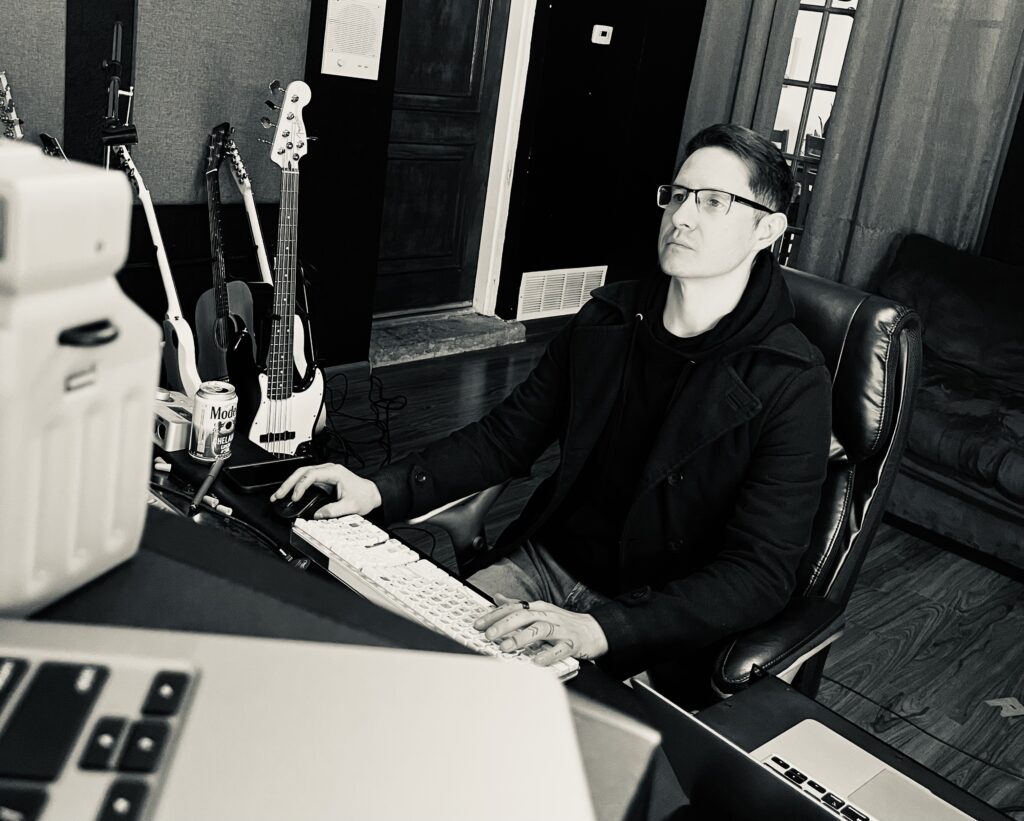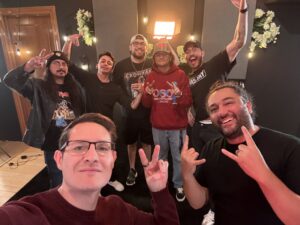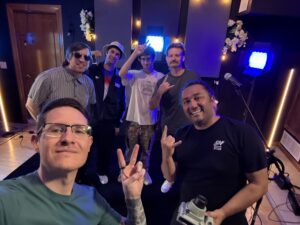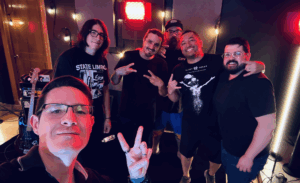So, you want to run a studio? Let me save you some time. You’re in for a wild ride buddy. On paper, it sounds like the dream: recording bands, making music, being part of something bigger than yourself. And don’t get me wrong, it is. But the reality is, your going to be tested. It’s a grind filled with failures, egos, money problems, broken gear, late-night headaches, and a never-ending list of lessons you only learn the hard way.
This isn’t me trying to scare you off either. I’ve been at this for almost 20 years with Let Down, and I’m still learning. The truth is, running a studio will test your patience, your wallet, and your sanity. But if you stick with it, it will also give you the best memories and the deepest sense of purpose you’ll ever find in music, which is why we continue to do it.
So before you dive headfirst into the recording world, here are a few harsh realities we learned along the way that we think you should know before taking this trip.
#1 – It’s going to be a shit show (at first)
When I first started recording bands, I couldn’t explain the excitement I felt just hitting that record button. I’d set up the cheap mics I could afford, tell the band to start playing, and imagine I was about to capture the next big sound in El Paso. Boy, was I wrong.
From day one, problems stacked up fast. The drums sounded awful, the guitars were thin and hollow, and the singer had no clue what they were doing. Nothing came out the way I expected. And that was just the tracking, learning the DAW was another nightmare. Programs like Cubase and Nuendo left me scratching my head through every session. I’d spend hours recording and mixing, only to end up with results that sounded terrible. Even though I wasn’t charging at the time, it was still crushing to hear how far off I was from what I had imagined.
What I didn’t realize then was that becoming an audio engineer, producer, and mixer is a monumental task. It takes years of trial and error. But every failure taught me something. Slowly, I figured out what I was doing wrong, made adjustments, and got better. Eventually, I reached a point where the sound improved enough that I felt confident charging for my work, even if it was a few bucks a song at the beginning.
The best advice I can give to anyone starting out is this: don’t charge in the beginning. You’re going to make mistakes, and that’s okay. It’s part of the process. Nearly 20 years into Let Down, I’m still learning new approaches and techniques. In audio engineering, experience is everything. Put in the work, embrace the failures, and chase every bit of knowledge you can because it all adds up to growth and knowledge you will use in the studio.
#2 – Money will get in the way
Let’s walk through a scenario every young engineer faces. You’ve decided to put together your first recording setup so you can release a demo. You hop on Amazon or Sweetwater, start browsing gear, and instantly realize two things: you don’t know what half of this stuff is, and your bank account can’t handle much of it anyway. Don’t worry, we’ve all been there.
Budgeting for your first rig is tough because costs add up fast. And yes, in recording, you usually get what you pay for, but that shouldn’t discourage you. In the beginning, it’s impossible to compete with million-dollar studios, and that’s okay. The goal at this stage isn’t perfection, it’s progress. Focus on researching, buying what you can afford, and, most importantly, staying out of debt. I learned this the hard way and had to battle years of debt because of my stupid purchases that didn’t even make the studio sound better.
You don’t need a legendary microphone, an expensive preamp, or the same interface the pros use. Start simple. A quality mic like the Shure SM57 and an affordable interface like the Focusrite Scarlett are more than enough to get your feet wet. The truth is, early in your career you’re too inexperienced to get the most out of high-end gear anyway.
Here’s the bonus: if you can make budget gear sound good, imagine what you’ll be able to do once you upgrade. That’s the cycle to follow. Learn the basics, master the tools you have, and grow into better equipment as your skills (and budget) expand.
#3 – Plugins are scams
So what do I mean when I say plugins are scams? In my experience, most of them are. Early on, I used to think, “That YouTuber used this plugin, so I need it too if I want that “sound.” The truth? You don’t. The stock plugins that come with your DAW are more than enough when you’re starting out and honestly, they’re bad ass if you learn how to use them.
You don’t need to blow your money buying plugin after plugin just because it looks cool or makes big promises. Nine times out of ten, you can recreate the same results with the tools already in your DAW. This is a skill you need to learn in order to become a great engineer. A great engineer knows what to use when a particular situation arises. I learned this the hard way, wasting a lot of cash on flashy plugins that I never use anymore.
Instead, focus on the fundamentals: mic placement, capturing solid performances, subtractive EQ, and basic mixing techniques. Those skills will take you way further than the latest plugin fad or tutorial. And here’s a tip: when you see someone on YouTube, Instagram, or TikTok showing off a plugin, remember they’re often working with tracks that were already professionally recorded using tried-and-true methods. The plugin isn’t the magic, it’s the foundation underneath it.
#4 – Learning to deal with bands/artists is going to suck
Egos will test you in a studio. Becoming an effective audio engineer or producer means learning patience, because working with artists will push your tolerance for chaos to the limit. Everyone wants to be a rockstar. Everyone wants to be famous. And when you run a studio, you’ll face musicians who think they’re already there. You’ll see bands argue, fight, and even break up mid-session. Hurt egos are part of the territory.
Your job is to navigate those moments without losing momentum. As an engineer, you need to create an environment that keeps the session moving, while still fostering creativity and fun. Being in a band is one of the coolest things in life but it also requires teamwork and effort from everyone involved, including you when you are in the studio.
There will be times when your patience is tested. Learn to stay calm. Learn to handle conflict with grace and humility. Owning a studio means working with people from every background and personality type. Most days, it’s an incredible job, but yes, you will deal with difficult people. Never forget: it’s your studio, not theirs. Don’t let egos run the show.
#5 – Learning to mix will destroy you
Mixing music is hard. Plain and simple. It will take you years to get good enough to compete with the pros and that’s okay. Why? Because mixing is all about experience. Early in your career, you just haven’t seen or heard enough to know how to solve the problems that pop up in a session. The subtle art of mixing and mastering only comes with time and repetition. I’ve been at it for almost 20 years, and I’m still learning every day. I still find ways to improve my skills daily.
Mixing can feel discouraging. You’ll spend hours on a track, only to throw in earbuds and hear mistake after mistake that still needs fixing. But that’s part of the process. The reason you keep going is because when it finally clicks, when a mix locks in and the song comes alive, there’s no better feeling. Both you and the band will feel it and the excitement to release will sink in!
Every engineer approaches mixing differently. Your goal is to give yourself as many chances as possible to mix across all types of genres. Those experiences will shape how you hear music and eventually lead you to your own style and sound. If that sound resonates with artists, bands will come back for more and that’s how your studio grows. Practice, practice, practice.
Most people give up when they realize how tough this art really is. Yes there are a million tutorials out there but you still have to do the work on your own. This is your chance to push through. Keep learning, keep mixing, and keep searching for your sound. Once you find it, bands will start searching for you, if it’s good enough.
# 6 – Let the shit talking begin!
Rest assured, once you start releasing music under the name of a studio, you’re going to get dragged through the mud. Every mix will be critiqued, every recording decision questioned, and every band you work with scrutinized. That’s just part of the game. With nearly everyone owning a home studio these days, the competition is endless. You can spend days perfecting a mix, feel it’s finally ready, and still have some stranger rip it apart. Other studio owners will always think they can do better.
Why? Because music is subjective. Criticism is inevitable and you have to accept it if you want to survive in this business. Your job is to pour passion and care into every project, no matter what anyone else says. Reputation isn’t built on having the “best” mixes—it’s built on consistency, professionalism, and making artists feel comfortable and supported in your studio. Strive to make your studio, even if it’s a bedroom, the most comfortable place it can be.
So forget the noise, ignore the bullshit, and keep moving forward. The only thing that matters is staying focused on your mission: making great music and building lasting relationships.
# 7 – You are going to get sniped
Here’s a scenario you’ll face over and over if you own a studio: you meet with a band, they’re excited to work with you, and together you agree on a budget that works for everyone. They leave, you feel good about the meeting, and you’re pumped for the session. A few days before recording, you text to confirm, no answer. You call the next day, nothing. Session day comes, you DM them, still nothing.
Weeks later, you scroll past their social media and see them promoting their “new single.” Turns out, they went with another studio and never bothered to tell you. What happened? You probably got undercut. Another studio offered them a cheaper price or even did it for free. This is what we call “sniping.” Most bands are painfully budget-conscious, and to them, it seemed like a good deal.
Don’t stress, it comes with the territory. This will happen again and again. But here’s the thing: reputations always catch up. We encourage new studio owners not to engage in this practice. People who play those games eventually get found out. Your job is simple, stick to your guns. Deliver the best product you can, build real relationships with your clients, and focus on quality. That’s the only thing you can truly control in this business.
Conclusion
At the end of the day, running a studio is basically signing up for a lifetime subscription to chaos. Yup, I said it. You’ll deal with broke bands who think they’re the shit, broken gear that somehow worked yesterday, singers who “forgot” their lyrics, and drummers who swear it’s the mics’ fault. But for every headache there are a million great memories you are going to accumulate. And that is why we keep doing it and coming back to the chaos. Running a studio is fuckin amazing and I wouldn’t trade anything for it in the world!







